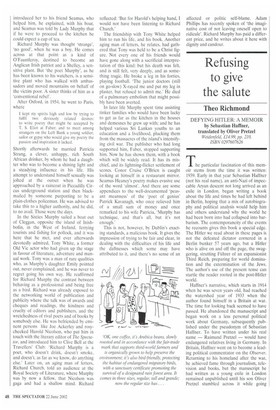Refusing to give the salute
Theo Richmond
DEFYING HITLER: A MEMOIR by Sebastian Haffner, translated by Oliver Pretzel Weidenfeld, £14.99, pp. 210, ISBN 0297607626 The particular fascination of this memoir stems from the time it was written; 1939. Early in that year Sebastian Haffner (not his real name), an anti-Nazi of impeccable Aryan descent not long arrived as an exile in London, began writing a book about the life and times he had left behind in Berlin, hoping that a mix of autobiography and political analysis would help him and others understand why the world he had been born into had collapsed into barbarism. The contemporaneity of the events he recounts gives this book a special edge. The Hitler we read about in these pages is not the defeated dictator cornered in a Berlin bunker 57 years ago, but a Hitler who is alive on and off the page, the swaggering, strutting Rihrer of an expansionist Third Reich, preparing for world domination and the extermination of the Jews. The author's use of the present tense can startle the reader rooted in the post-Hitler world.
Haffner's narrative, which starts in 1914 when he was seven years old, had reached the watershed year of 1933 when the author found himself in a Britain at war. The time for looking back seemed to have passed. He abandoned the manuscript and began work on a less personal political work about Germany, subsequently published under the pseudonym of Sebastian Haffner. To have written under his real name — Raimund Pretzel — would have endangered relatives living in Germany. In Britain, Haffner went on to become a leading political commentator on the Observer. Returning to his homeland after the war, he achieved fame through journalism, television and books, but the manuscript he had written as a young exile in London remained unpublished until his son Oliver Pretzel stumbled across it while going
through his father's desk after he died in 1999 at the age of 91.
Published in Germany the following year, the book received enthusiastic reviews, wide media attention, and stayed in the non-fiction bestseller list for 42 weeks. This suggests a healthy readiness on the part of his countrymen to confront their past, perhaps an almost flagellatory pleasure in receiving verbal punishment at the hands of an author who can be excoriating about the German national character, yet also capable of switching from disdain to admiration. Writing with passion, he veers between love of the old Germany that had gone and hatred of the new Germany that had replaced it. The tragic transition from the one to the other forms the heart of this book.
We follow his life as schoolboy, adolescent student and trainee lawyer on the darkening path from German defeat in the first world war to the socially destructive inflation of 1923, the relative orderliness of the Stresemann years when 'evil, diabolic forces' bubbled below the surface, and on to the victory of these forces as his fellow citizens succumbed 'with less and less resistance to the glamour of depravity and the ecstasy of evil'. They might have offered more resistance, he suggests, if the parties opposed to Nazism had provided effective leadership. A two-thirds majority 'legalised' Hitler's dictatorship in the elections of March 1933, but 56 per cent of the elec
torate had voted against him. Haffner reserves special contempt for the Social Democrats who let them down — 'betrayal' is his word for it,
Episodes from everyday life provide memorable illustrations of what was happening throughout the country, creating the climate in which nihilism could flourish: rushing to the market with his mother to buy food before his father's monthly salary was reduced to the value of a tram ride; winning a young girl dressed in a Turkish page-boy's costume — his tombola prize in the desperate escapism of the Berlin carnival; observing a classmate during a boring lesson drawing a strange symbol in his notebook — Haffner's first sight of a swastika; his shame at not making a stand when confronted by the SA; the heroism of a cabaret satirist; Brownshirts shattering the silence of the High Court library as they evict Jewish lawyers; a warm spring day in 1933 when Haffner sits on a bench with a Jewish girlfriend as groups of school children go by chanting Ada verrecker Perish Judah!
This is a riveting story, which the translator helpfully continues in a brief Afterward to satisfy the reader's curiosity about Haffner's life after we leave him in the final chapter, sick at heart, preparing to depart for temporary exile in Paris. Oliver Pretzel, offspring of an Aryan and a Jew, has served his father well both as translator and literary midwife.











































































 Previous page
Previous page